Dear friends of Berkeley Journalism,
Our Spring Welcome visit, which gives recently admitted applicants a chance to see the School up close so they can decide if they want to come, is a powerful reminder of just how strong the appeal of journalism remains. Despite the anti-media cynicism and disparagement that they’ve grown up with, the representatives of this rising generation who joined us at North Gate Hall in March needed no convincing that the careers they are considering would offer them what journalism has always offered: an opportunity to serve, a chance to stir things up and make things better.
These prospective members of the Class of ‘21 had plenty of questions, about whether they actually need a graduate degree, how they would handle the costs, whether the unique strengths of Berkeley’s program fit with their goals. But like many of my colleagues, I was humbled and inspired by the commitment they seem prepared to make. It was enough to restore a measure of confidence in a future that sometimes seems to promise only darkening skies. And with news that some of the country’s most visionary philanthropists have begun to pledge major outlays toward reviving local reporting, the prospects that these students will have career opportunities commensurate with their commitment are brightening.
There’s a lot of good news to share, so let’s start with this year’s Pulitzer Prizes, which honored four alums among the recipients.
Stephen Hobbs (’14) was on The South Florida Sun Sentinel team that won the Pulitzer Prize for Public Service, “for exposing failings by school and law enforcement officials before and after the deadly shooting rampage at Marjory Stoneman Douglas High School.” He was also among the finalists in the Breaking News category. Alexandra Berzon (‘06) was on the team at The Wall Street Journal that won the top prize for National Reporting “for uncovering President Trump’s secret payoffs to two women during his campaign who claimed to have had affairs with him, and the web of supporters who facilitated the transactions, triggering criminal inquiries and calls for impeachment.” Garance Burke (‘04) was on the Associated Press team named finalists in the National Reporting category “for authoritative coverage of the Trump administration’s migrant family separation policy that exposed a federal government overwhelmed by the logistics of caring for and tracking thousands of immigrant children.” And Jennifer Bjorhus (‘93) of The Star Tribune was a finalist in the Local Reporting Category “for an illuminating and disturbing series that exposed breakdowns in Minnesota’s investigation and prosecution of rape cases, and how such ineptitude fails victims of sexual assault.”
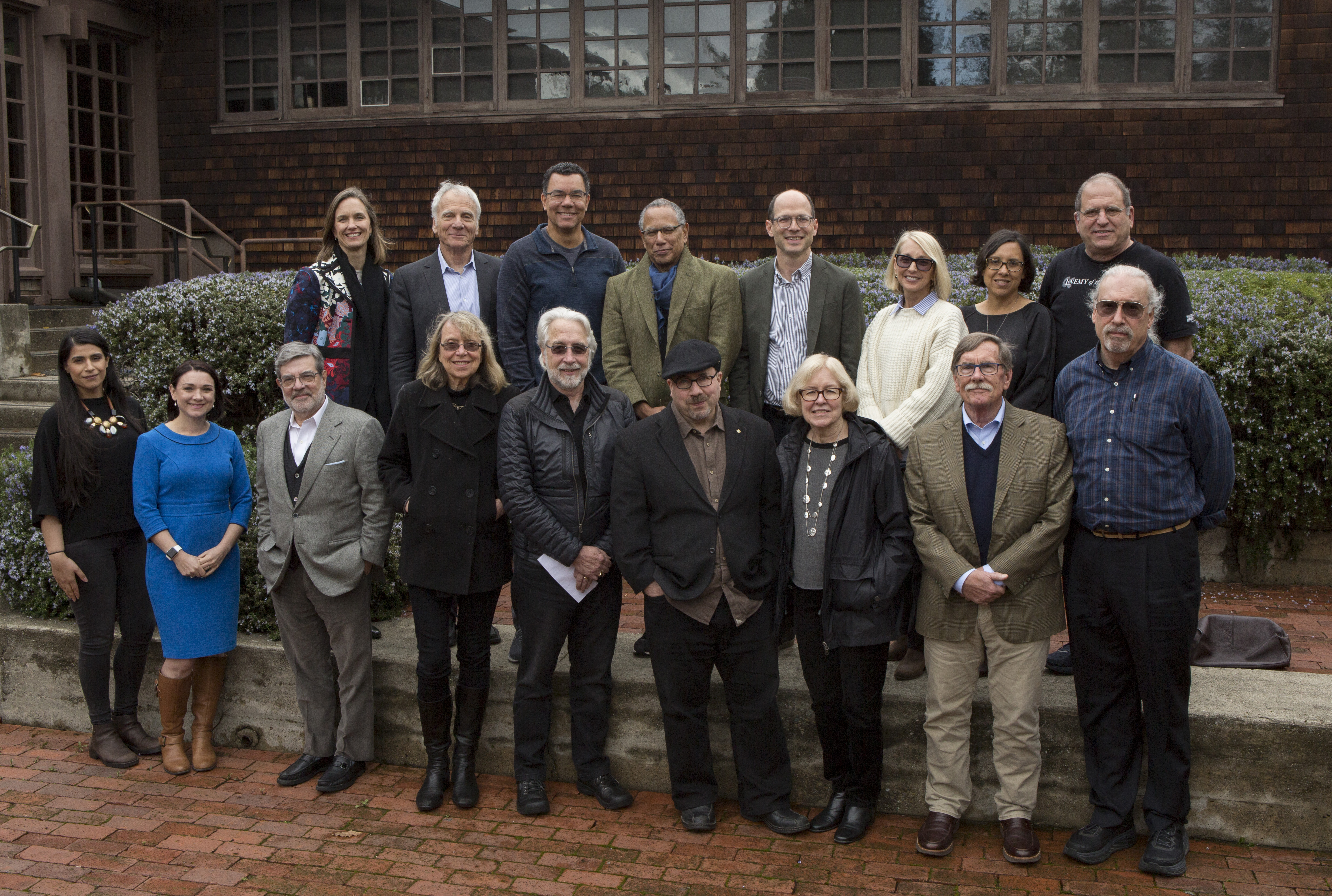
Clockwise from left: Angela Filo, Edward Wasserman, Pete Nicks, Dean Baquet, Jason Spingarn-Koff, Minette Nelson, Carrie Lozano, Jonathan Logan, Richard Logan, Robert Bishop, Jo Anne Wallace, Craig Newmark, Richard Gingras, Esther Wojcicki, David Corvo, Tamara Keith and Zainab Khan. (Not pictured: John Battelle, Simone Coxe, Gary Knell, Mark Luckie, Daniel Ellsberg, Robert Reich, Steve Silberstein, Bill Whitaker, Ernest Wilson and Edward Wong.) Photo: Anne Wernikoff (’19)
Berkeley Journalism’s Advisory Board convened in February with the annual conclave kicked off with a lively public event, “Fit to Print” with New York Times Executive Editor Dean Baquet and myself in conversation followed by a handful of special School events. NPR Correspondent, Board Member and alum Tamara Keith (‘01) gave us an inside look at reporting on the White House in discussion with Prof. Geeta Anand, and Senior Lecturer Deirdre English and Board Member Jo Anne Wallace led an important discussion on how to build a leadership pipeline for students. We were privileged and honored to host this exceptional group of media professionals, innovators, educators, and thought leaders.
The Investigative Reporting Program’s PBS “Frontline” documentary “Trafficked in America” was named one of seven finalists for the prestigious Goldsmith Prize for Investigative Reporting awarded by the Shorenstein Center on Media, Politics and Public Policy at Harvard’s Kennedy School. The film was written and produced by Daffodil Altan and Prof. of Visual Journalism Andrés Cediel, both from the class of ’04. Altan was also the film’s correspondent. Lecturer Abbie VanSickle (UC Berkeley School of Law ’11) was the film’s reporter. IRP founder, Prof. Lowell Bergman and IRP director, Associate Adjunct Prof. John Temple, were the film’s executive producers, and Loi Almeron (’16) and Kathleen Seccombe (’15) were associate producers.
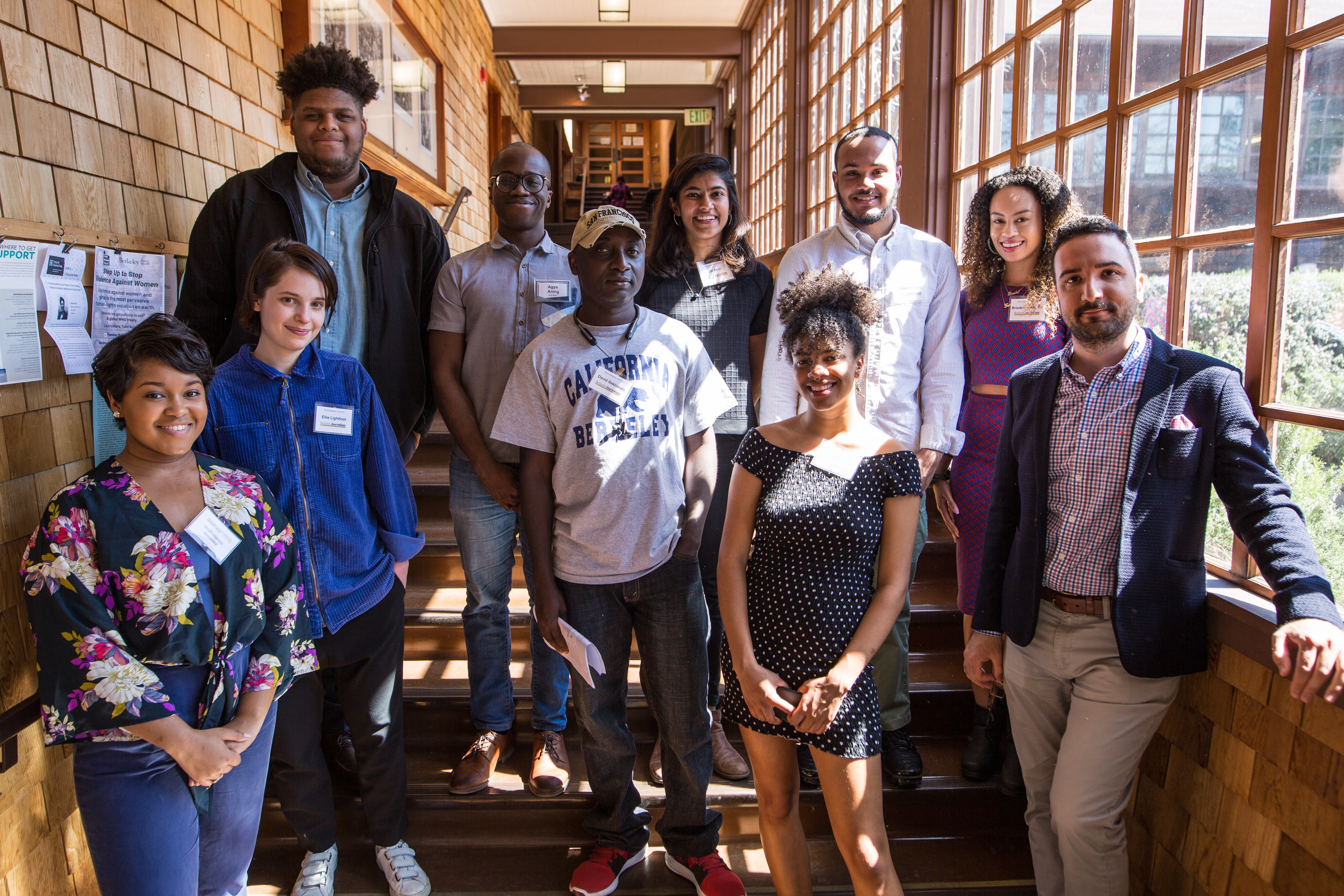
The 2019 Johnathan Rodgers Fellows, funded by Class of ’67 alum Johnathan Rodgers to increase diversity at the Journalism School, visited during Spring Welcome Visit. From left: JC Whittington, Ellie Lightfoot, Skyler Glover, Agya Aning, David Sekiranda, Jill Shah, Myles Poydras, Brooke Henderson, Mouhanad Al Nashar Al Rifay and Chloe Reynolds. Photo: Walker Dawson (’19)
We’ve had a flurry of news of student accomplishments. Katey Rusch (’20)—who is concentrating on narrative writing and investigative journalism after 10 years as an on-air reporter, writer, and producer in local TV news—is our latest student to win a White House Correspondents’ Association scholarship. Multimedia reporter Alondra De La Cruz (’19) received the scholarship last year.
Wesaam Al-Badry (’20)—a multimedia artist who seeks to marry fine art with journalistic narratives—was profiled by celebrated photographer James Estrin in The New York Times. In January, Wesaam was also profiled in California Magazine about his new exhibit at the De Young Museum, his experience growing up an Iraqi refugee, and the challenge of capturing the dignity in suffering.
Documentary filmmaker Rachel Mueller (’20) was named a 2019 Overseas Press Club of America Scholar. She will spend her OPC Foundation fellowship this summer at GroundTruth Films.
Sarah Hoenicke (’19) has published her thesis project on a writing workshop in Sri Lanka aiming for peace in the aftermath of Civil War in Literary Hub. She has also been selected for a Fulbright award— the world’s largest and most diverse international educational exchange program— to Sri Lanka.
Salina Nasir (’19) wrote an A1 story for The East Bay Express on a former translator for U.S. troops in Afghanistan who now lives near San Francisco, and how Congress could continue to offer people like him safety through the Special Immigrant Visas (SIVs) program, but doesn’t.
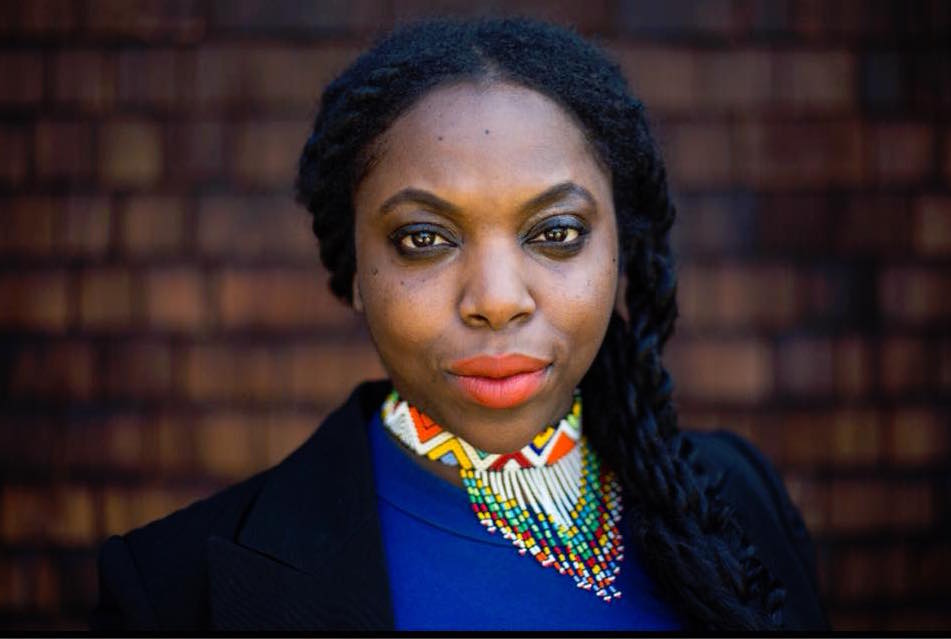
Angélica Ekeke (’20)
Angélica Ekeke (’20) presented her work “The Removal: the visual symphony”— a new creative medium fusing live journalistic reporting, documentary film, and a live score— March 7 at The California Academy of Sciences.
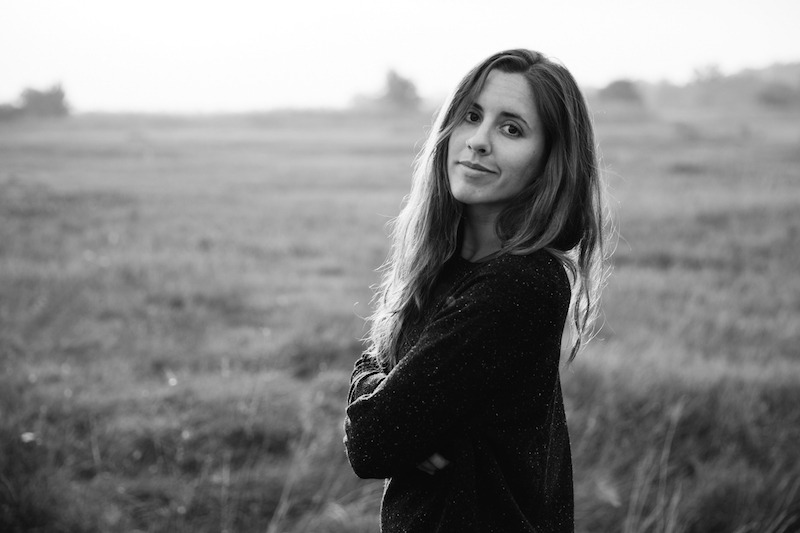
Eva Rendle (’19)
Eva Rendle (’19) was named the recipient of the newly established $3,000 Brian Pollack Documentary Film Scholarship. The fellowship, established in 2018, is awarded annually to a promising student of documentary to honor the late filmmaker and alum, who died in 2016.
Max Brimelow (’20) has won a $5,000 Hugh Fulton Byas Memorial Scholarship— annually presented to students of British origin who are studying in the U.S.— honoring The New York Times Tokyo correspondent who covered Japan from 1927 to 1941.
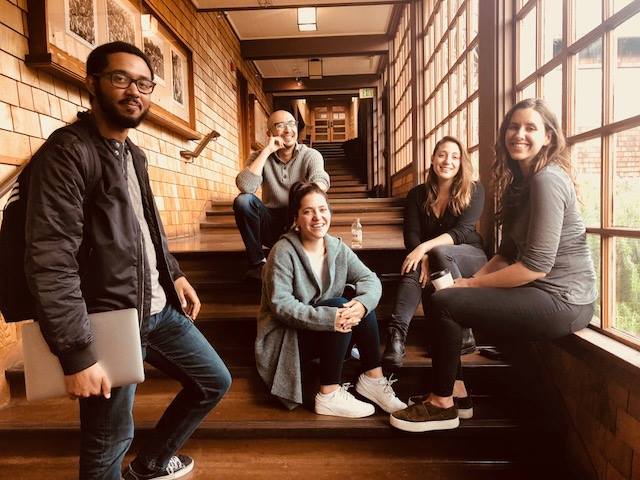
From left: Alex Nieves, J.P. Dobrin, Marian Carrasquero, Emma Schwartz and Eva Rendle. Photo: Marlena Telvick
Marine Corps veteran and multimedia journalist Mallory Newman (’19)—whose work focuses on police, politics, human rights, and equality— is a recipient of one of 20 ProPublica Diversity Scholarships worth $750.
Bo Kovitz (’19) was named this year’s Marlon T. Riggs Fellow. Created in honor of the late alumnus, filmmaker, and professor Marlon T. Riggs (’81), who co-founded the documentary program, the $10,000 fellowship was created in 2014 through the efforts of Vivian Kleiman, Riggs’s former collaborator.
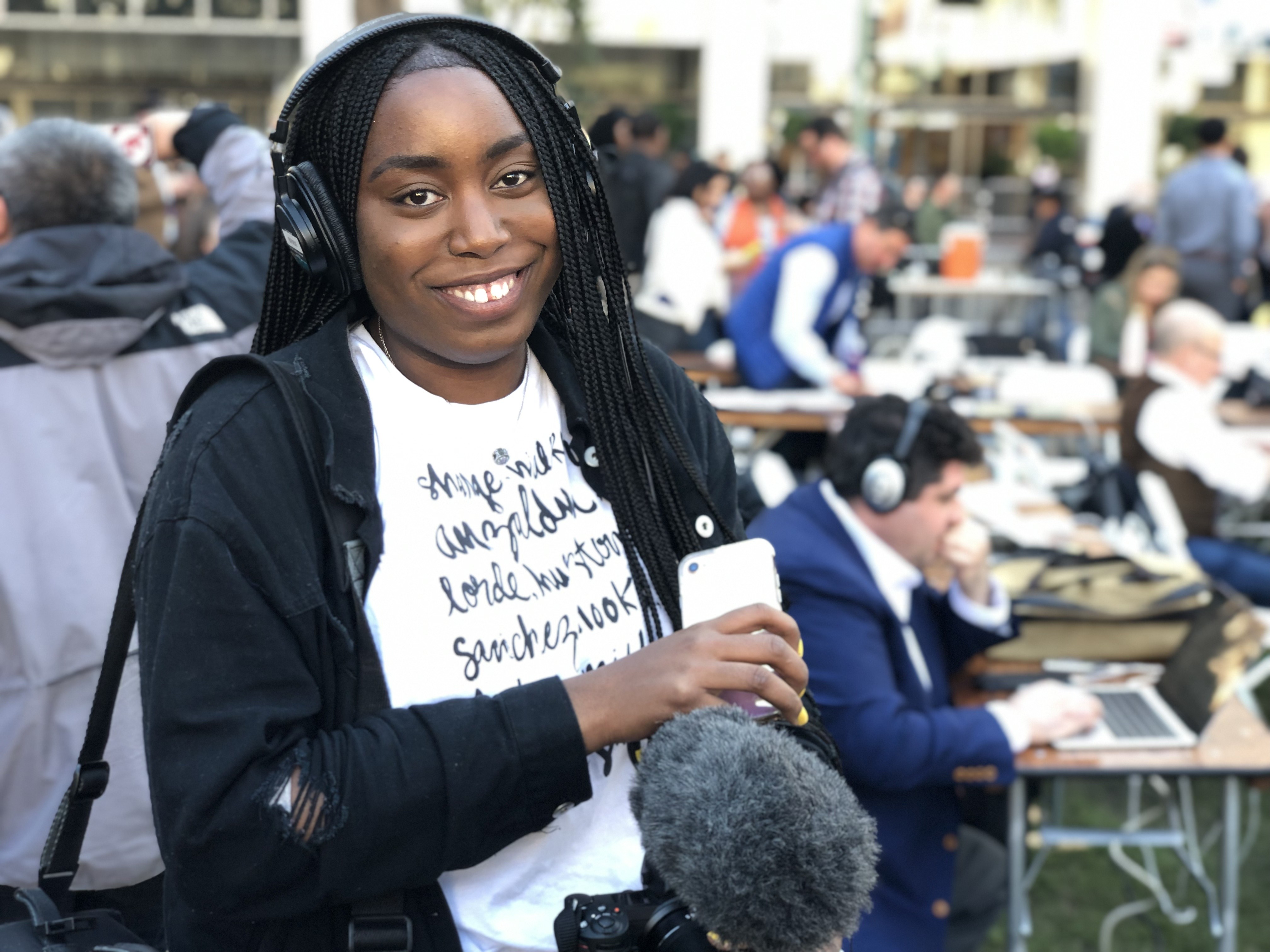
Ashley Omoma (’20) covering the Kamala Harris rally in Oakland in January. Photo: Prof. Andrés Cediel
It’s the time of year we begin finding out where our second-year students are going next: Annette Choi will be a Data Visualization Intern at FiveThirtyEight; Brian Perlman will be data journalism intern at Kansas City Public Television through the Dow Jones News Fund; Pedro Cota was named a National Association of Hispanic Journalists/NBC News Summer Fellow and will work at NBC/MSNBC headquarters in New York; Casey Smith has been awarded a Pulliam Fellowship at the IndyStar, where she’ll be working with the news and investigations teams; Darren Scioneaux will be interning with the NBC Sports Bay Area news department, Angélica Ekeke will be doing a non-traditional internship at the Peter Behrens School of Arts at the Hochschule Düsseldorf University of Applied Sciences in Germany, honing her skills both in documentary photography and film. During her stay, she will also be working on a reporting project supported by the 2019 Berkeley Law School Human Rights Fellowship and the Pulitzer Center International Reporting fellowship.
Meg Shutzer and Mara Kardas-Nelson also received Berkeley Law School’s Human Rights Center Fellowships. Meg—an investigative reporter who works on issues of criminal justice, race and human rights—will be working with the Center for Investigative Reporting, a nonprofit news organization based in Emeryville, California. Mara will be working in Freetown, Sierra Leone reporting on women who are imprisoned, or threatened with imprisonment, due to their inability to pay back debts as small as $20. She will also investigate the role of the judicial system, police and lending institutions in perpetuating the use of these laws.
In alumni news, Rebecca Solnit (’84) is one of eight winners of the annual Windham-Campbell Prizes, among the world’s most prestigious literary awards. Rebecca, a journalist and essayist, was praised by the judges for her essays that “range through subject matters that include politics, history, literature, art, and feminism in a manner at once provocative, erudite, and intensely engaging.” She recently co-edited The Best American Essays 2019, selecting the best essays of the year from hundreds of magazines, journals, and websites.
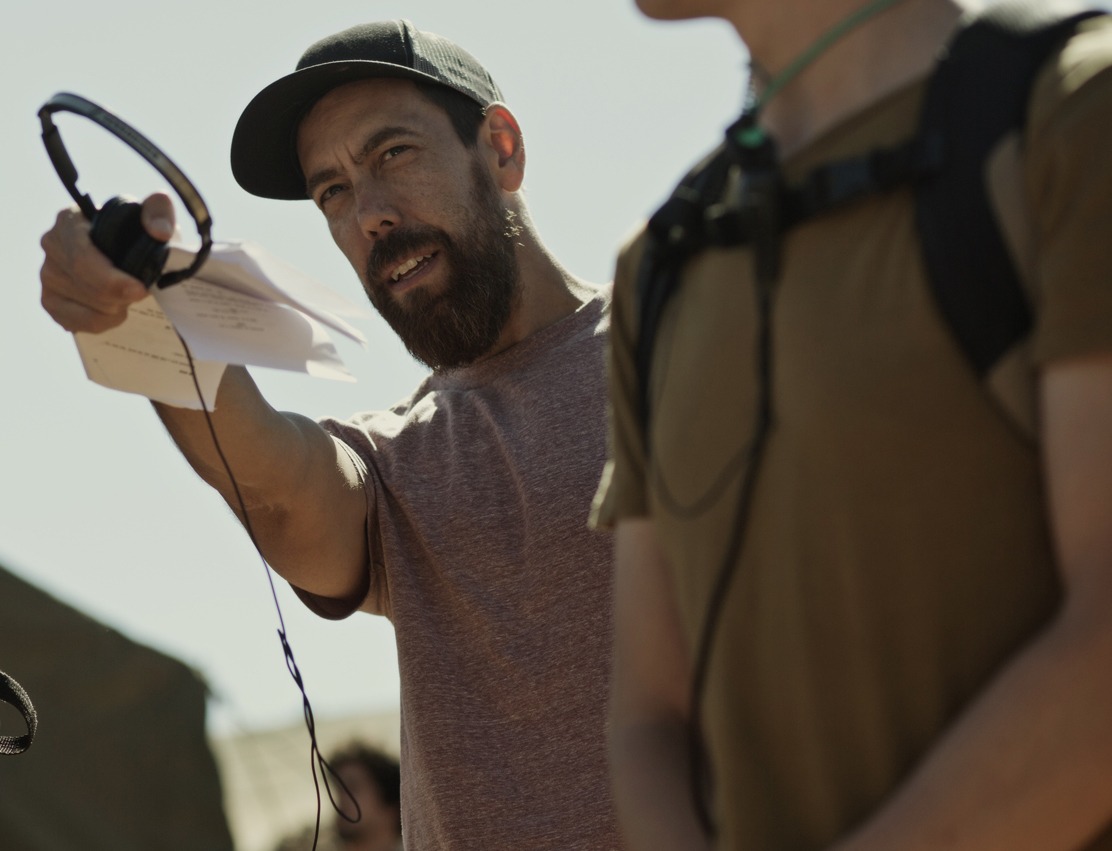
Producer Dan Krauss filming the fictional remake of his documentary “The Kill Team.”
Lecturer Dan Krauss’s (‘04) fictional version of his documentary “The Kill Team,” with Alexander Skarsgård and Nat Wolff, was sold to indie distributor A24 (“Moonlight,” “Lady Bird,” “Hereditary”) and will premiere later this month at the Tribeca Film Festival. He is also directing an episode of the Netflix show “Dirty Money” with Jigsaw Productions and Alex Gibney.
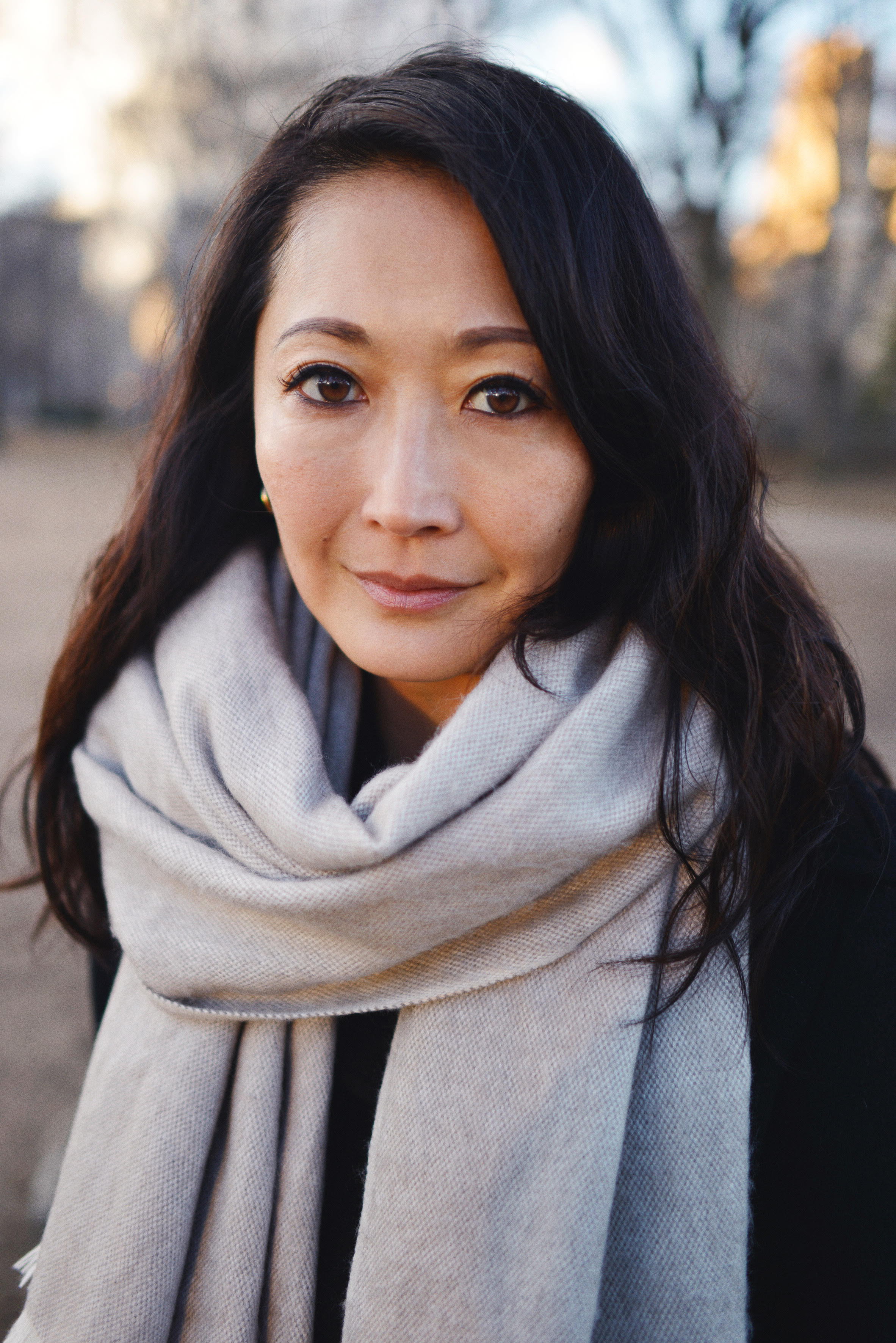
Producer Emily Taguchi. Photo: Samantha Sergi
Also at Tribeca, the documentary “After Parkland,” directed, written, and produced by alum Emily Taguchi (’06), will have its world premiere.
Zainab Khan (’16)—audience strategy editor at The New York Times and a member of Berkeley Journalism’s Advisory Board—was featured in Nieman Journalism Lab’s annual predictions report.
Gregg Bell (’00)—Seahawks beat writer at the News Tribune in Tacoma, Wash.— was named the National Sports Media Association’s 2018 Sportswriter of the Year for Washington State. The winners will be honored during the 60th annual NSMA Awards in Winston-Salem, N.C. in June.
N’Jeri Eaton (‘10) and Nancy DeVille (‘15) were selected for the Poynter Institute’s 2019 Leadership Academy for Women in Digital Media in April.
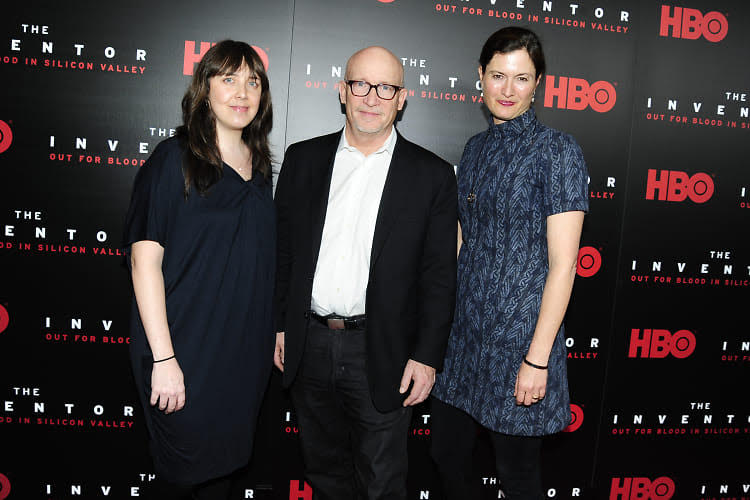
Award-winning producer Jessie Deeter (’01), whose work includes the 2006 “Who Killed the Electric Car?,” (right) is pictured with producer Erin Edeiken and director Alex Gibney at the New York premiere of their new documentary, “The Inventor: Out for Blood in Silicon Valley,” on the rise and fall of Elizabeth Holmes and Theranos, the one-time multibillion-dollar healthcare company.
Alum Lauren Schwartzman’s (’18) Student Academy Award-medaling thesis film, “Dust Rising,” won Best Student Film at the San Luis Obispo International Film Festival. It also just screened in the Environmental Film Festival in Washington, D.C., the Sebastopol Documentary Film Festival, the Phoenix Film Festival and at the 2019 Berkeley Journalism Showcase at BAMPFA.
Emily Thomas’s (’18) thesis documentary “Blessings of Liberty” — following two families of Iraqi Christians in Detroit facing deportation—premiered at the Big Sky Documentary Film Festival in February. It also screened at the recent Detroit Film Festival.
Alum and Advisory Board member Esther Wojcicki’s new book, “How to Raise Successful People: Simple Lessons for Radical Results,” will be out in May.
Courtney Quirin’s (’15) first feature documentary, about the stewards of British Columbia’s Great Bear Rainforest, made its U.S. premiere at San Francisco IndieFest in February where it won the Jury Prize for Best Documentary Feature. Courtney directed, shot, and edited this film—first workshopped in a writing class with Prof. Michael Pollan during her final semester at Berkeley Journalism— as a two-year FilmHouse resident at the San Francisco Film Foundation.
Nebiat Assefa Melles and Olivia Rempel’s (both ‘18) remarkable thesis documentary “The Blue Devil”—about an invasive plant spreading across Ethiopia’s largest lake—premiered at the San Diego Black Film Festival, then screened at the Pan African Film & Arts Festival in Los Angeles and the Colorado Environmental Film Festival in February.
In faculty news, Prof. Mark Danner has received a Guggenheim Fellowship for a book he’s writing on the late New York Review of Books co-founding editor Robert Silvers. Mark has also been named to a new chair by the College of Letters and Science (L&S)—the largest of the university’s 14 colleges and schools—the Class of 1961 Endowed Chair in Journalism and English.
Associate Prof. Elena Conis (’04) spoke at the Trust in Science series hosted by the American Philosophical Society and American Academy of Arts and Sciences; published an essay on the long struggle to vaccinate against measles in Public Health Reports, and received a National Institutes of Health Grant for Scholarly Works in Biomedicine and Health, for her book-in-progress on the search for scientific truth.
Lecturer Adam Hochschild wrote a moving account for The New Yorker on the day the First World War ended and a book review in The Washington Post, and did talks around the country for his latest book, a collection of some of his best shortform work, Lessons from a Dark Time and Other Essays. One of Adam’s talks, invariably lucid and thoughtful, can be seen on C-Span.
The San Francisco Museum of Modern Art acquired 86 gelatin silver prints from Prof. Ken Light’s project, Midnight La Frontera, photographs taken at night from 1983-1987 along the U.S.-Mexico Border. Ken’s photographs were shown in two group exhibitions at the Crocker Art Museum in Sacramento: “The Roaming Eye: International Street Photography from the Ramer Collection” and “Call and Response, When We Say… You Say” at the University Art Museum at California State University, Long Beach. Ken and colleague Andrés Cediel also received a seed grant from the Jonathan Logan Family Foundation to collaborate on a documentary on the conflicts and contradictions of the U.S.-Mexico border, and how it has changed over the past generation. Using Light’s photos from the early 1980s as a starting point, the film is equal parts journalism and art, and will tell this story from the perspective of both migrants and border agents.
The New York Times named Prof. Michael Pollan’s most recent work, How to Change Your Mind: What the New Science of Psychedelics Teaches Us About Consciousness, Dying, Addiction, Depression and Transcendence, one of Top 10 Books of 2018. It is not true, by the way, that chewing the lower corner of page 67 of Michael’s book will induce a spiritual experience.
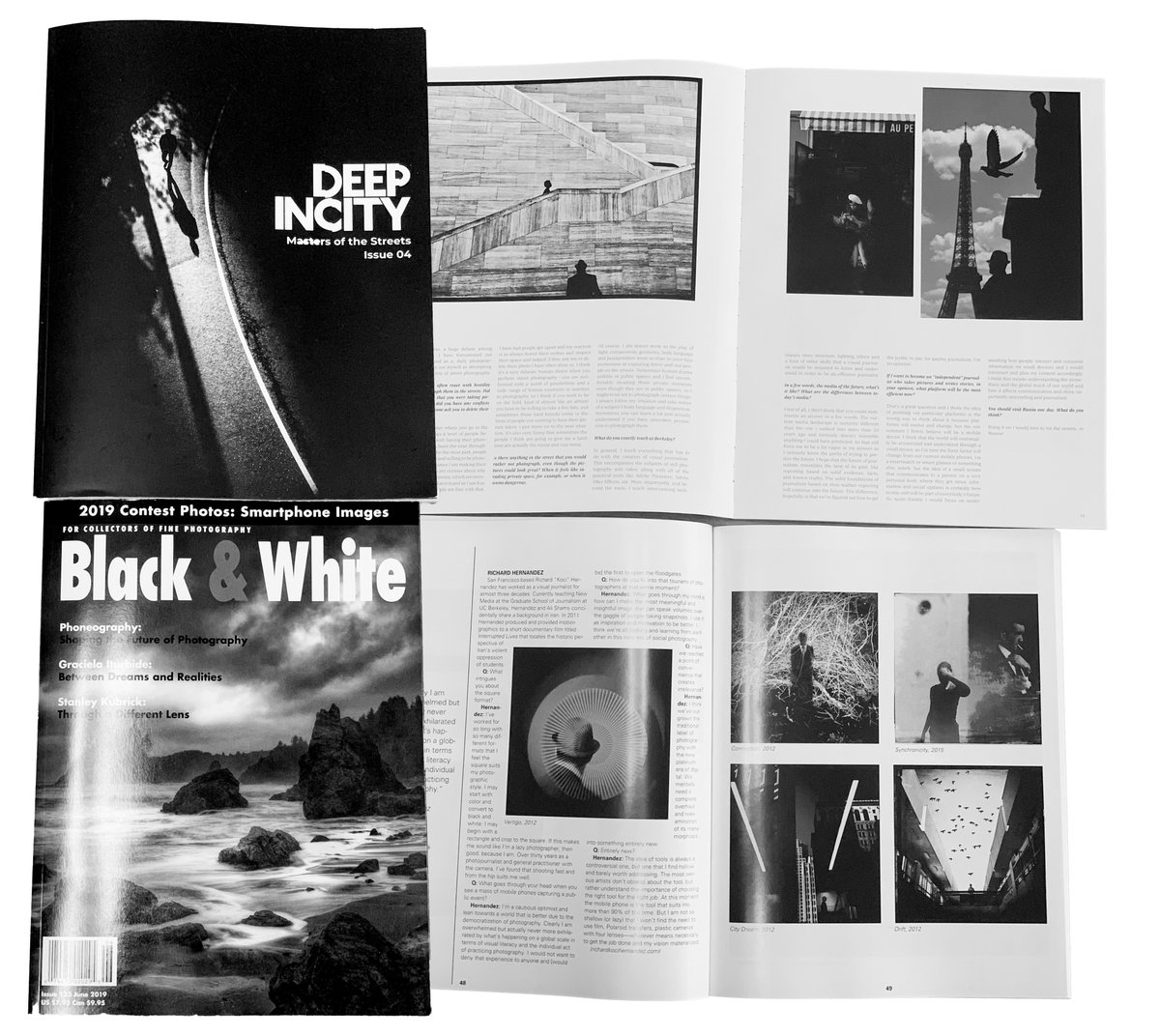
Associate Professor of New Media and Bloomberg Chair Richard Koci Hernandez’s photo work and interviews were featured in recent issues of Black & White Magazine and Deep in the City Magazine.
New Media lecturer and Assistant Dean of Academics Jeremey Rue (’07) and Berkeley Journalism Emeritus Professor Tom Goldstein were panelists at The Indian Express and Jindal School of Journalism and Communication’s (JSJC) “New media and Indian elections 2019” discussion held at the India International Centre in April.
Attorney and lecturer Thomas R. Burke, representing The Santa Rosa Press Democrat newspaper, won a unanimous California Court of Appeal ruling in March that dismissed a defamation suit filed by a Sonoma County real estate developer and his son-in-law. The suit challenged reporting about $202,000 in independent expenditures supporting candidates in the final two weeks of the 2016 Santa Rosa City Council election. The court ruled that the plaintiffs failed to prove the reporting was false and ordered them to pay the newspaper’s legal fees.
We have three retirements to announce. Prof. Lydia Chavez, a veteran of The Los Angeles Times and The New York Times, the founder and executive editor of the Mission Local news site, and a teacher with legions of admiring former students, is leaving for other pursuits, many of them scholarly; Investigative Reporting Program founder Lowell Bergman will also retire after decades mentoring the next generation, though he will continue research and reporting work with IRP and its spinoff, Investigative Studios Inc.; and Edwin Dobb, a mainstay of our narrative writing program, an environmental journalist and a writer for National Geographic, Harper’s and other top publications, will retire at the end of calendar 2019 after 10 years with the program.
Please join us in expressing the gratitude of the School and of the hundreds of students—and thousands of audience members—whose lives they have touched, and without doubt, will continue to touch.
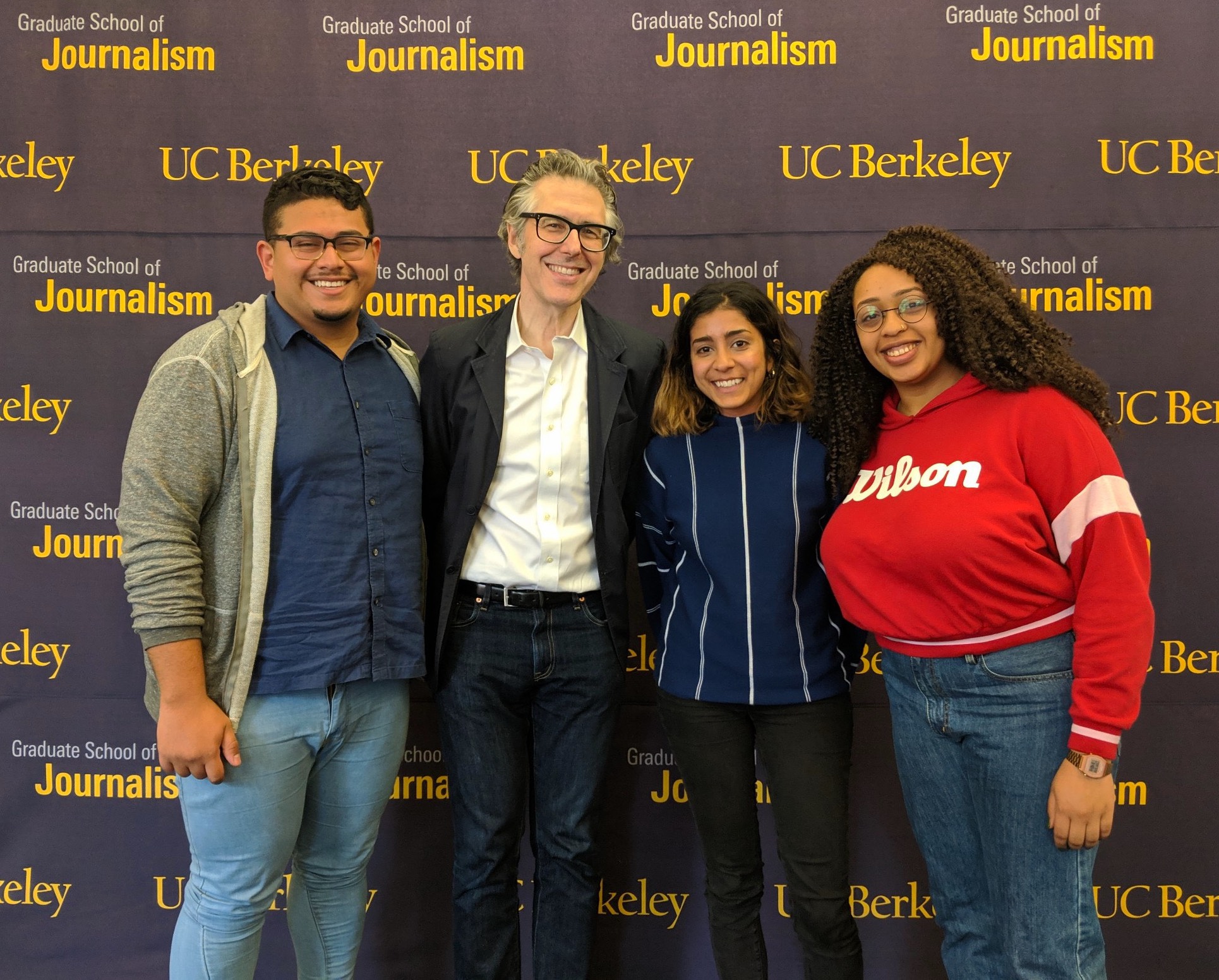
Second-year audio students Luis Hernandez, Muna Danish and Lee Mengistu with the incomparable Ira Glass, who gave each of them a detailed edit/feedback on their final audio projects-in-progress. Photo: Mary Kay Magistad
Ira Glass, whose “This American Life” sparked a renaissance in audio story-telling, generously took time out when he was on campus for a public appearance in March and held a master class with our audio students, orchestrated by audio program director Mary Kay Magistad. Having listened to the final projects of several of the students, Ira offered his critique during a 90-minute Saturday afternoon session in the Logan Multimedia Center before his public talk that evening, “Seven Things I’ve Learned,” at Zellerbach Hall.
Our latest “On Mic” podcast, produced by Luis Hernandez (’19) under the supervision of lecturer Ben Manilla, features Advisory Board member Dean Baquet, editorial chief of The New York Times, in an on-stage conversation with me before a packed house in February.
The School’s podcasts “Tales of Two Cities” and “North Gate Radio,” under the guidance of lecturers Kara Platoni (’99) and Ben Manilla, continue to find the quirky and the newsworthy in Richmond, Oakland and beyond.
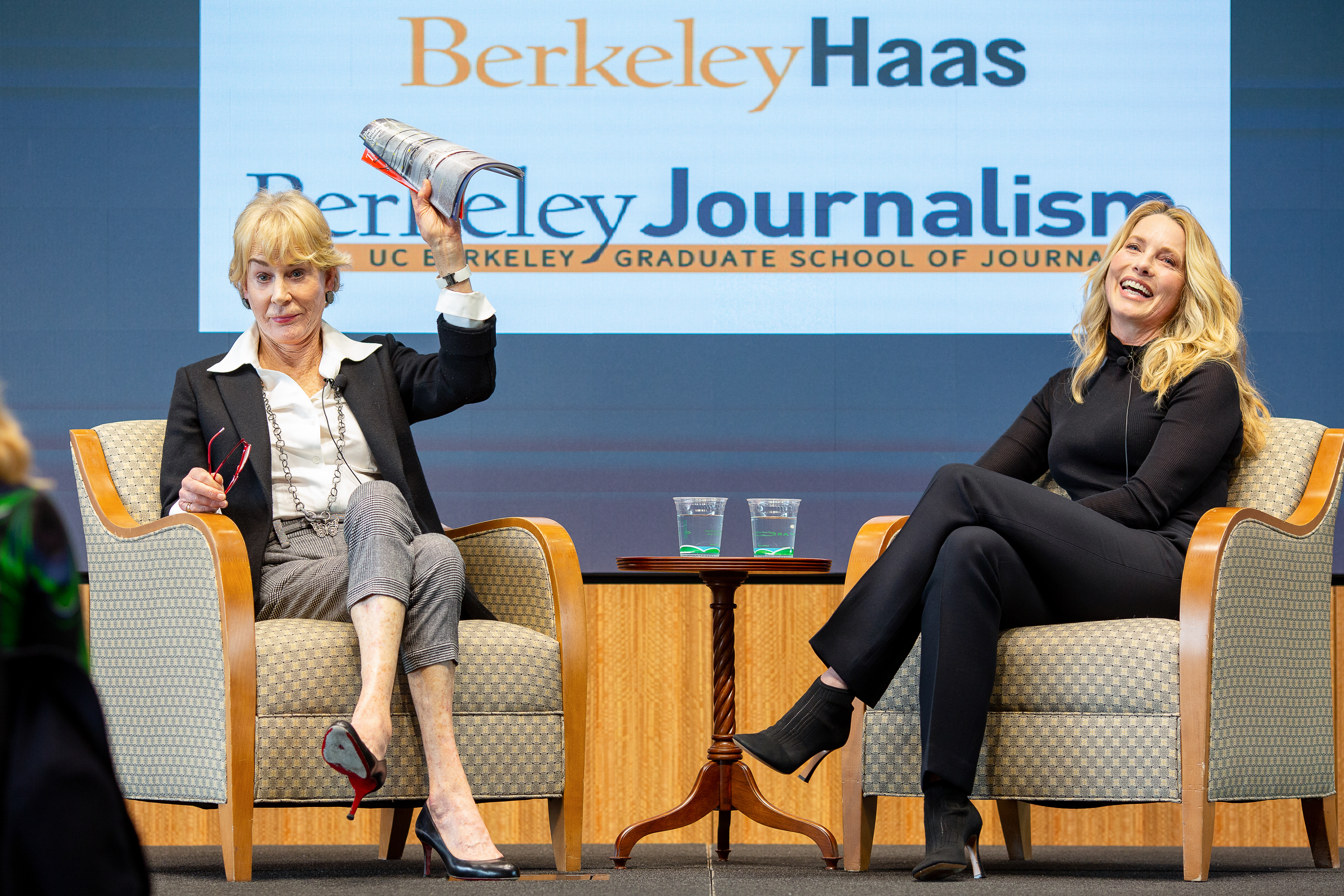
CALmatters Co-Founder Chris Boskin and Laurene Powell Jobs, President of Emerson Collective, at the 1st annual Chris Boskin Deans’ Speaker Series in Business & Journalism at the Haas School of Business February 7, 2019. Photo: Manali Anne Photography
On the events front, in January—thanks to a generous gift from Cal alum Michael Boskin in honor of his wife, Chris—Berkeley Journalism and the Haas School of Business welcomed philanthropist and activist Laurene Powell Jobs, president of the Emerson Collective, as guest speaker for the first annual Chris Boskin Lecture Series. Over 250 students, donors, and community members heard Chris and Laurene talk about journalism’s prospects at a time when its traditional business model has collapsed. Powell Jobs and Emerson support both for-profit and non-profit journalism ventures, including The Atlantic, ProPublica and Axios.
Julia Barton, executive editor of Malcolm Gladwell’s Revisionist History, joined lecturer and author Adam Hochschild for an evening conversation about a new Radiotopia podcast Julia co-created and in which Adam features, called Spacebridge. It’s about a time late in the Cold War, when Soviet and American ‘citizen diplomats’ used emerging satellite and Internet technology to connect as people.
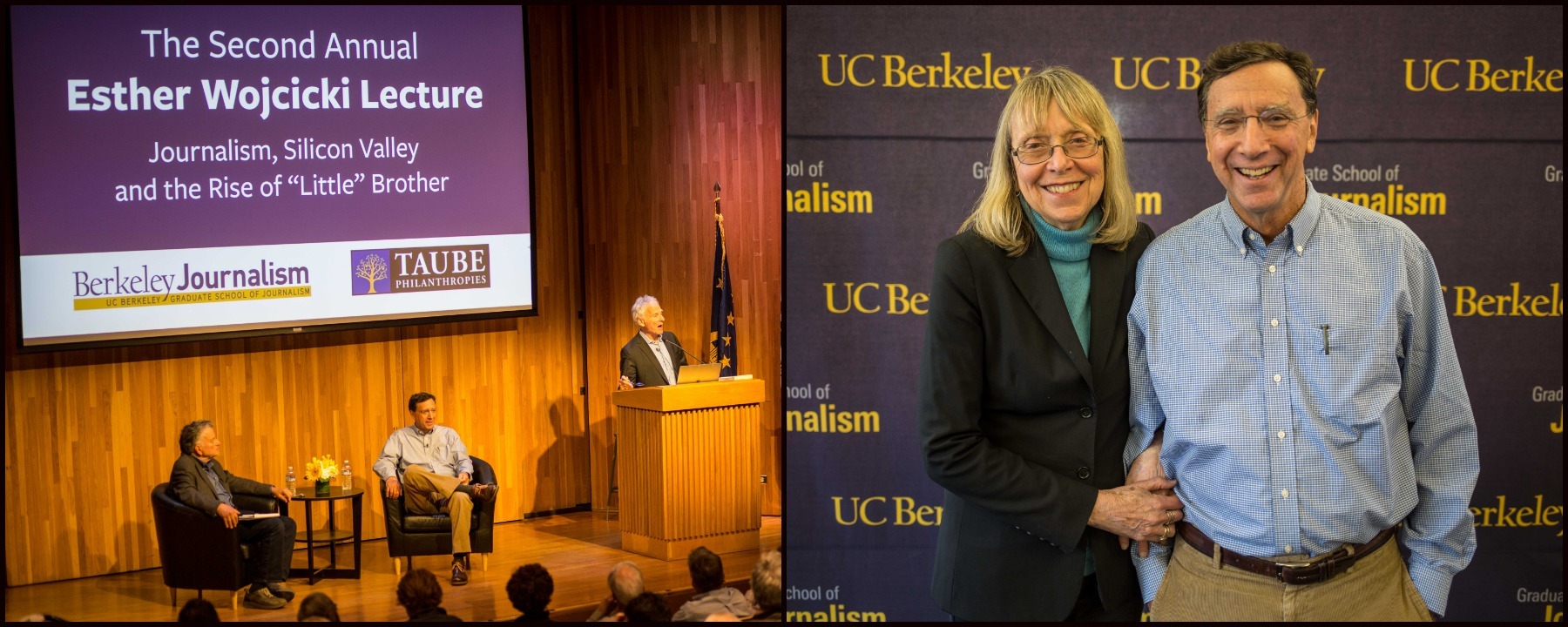
Lowell Bergman, John Markoff and Edward Wasserman. Esther Wojcicki and John Markoff. Photos: Walker Dawson (’19)
In April, we celebrated the 2nd Annual Esther Wojcicki Lectureship—a weeklong residency of talks and master classes sponsored by Taube Philanthropies—this year featuring pioneering tech reporter John Markoff in conversation with investigative journalist and Prof. Lowell Bergman of the Investigative Reporting Program.
We also hosted Jenni Monet, an award-winning journalist who writes about Indigenous rights and injustice on “The State of Indigenous Journalism”.
In February, author and New York University scholar Marion Nestle delivered a lecture series, “Food Politics 2019,” curated by Prof. Michael Pollan and presented in partnership with the Berkeley Food Institute and the UC Berkeley-11th Hour Food and Farming Journalism Fellowship, led by alum and New York Times Magazine contributor Malia Wollan (’08).
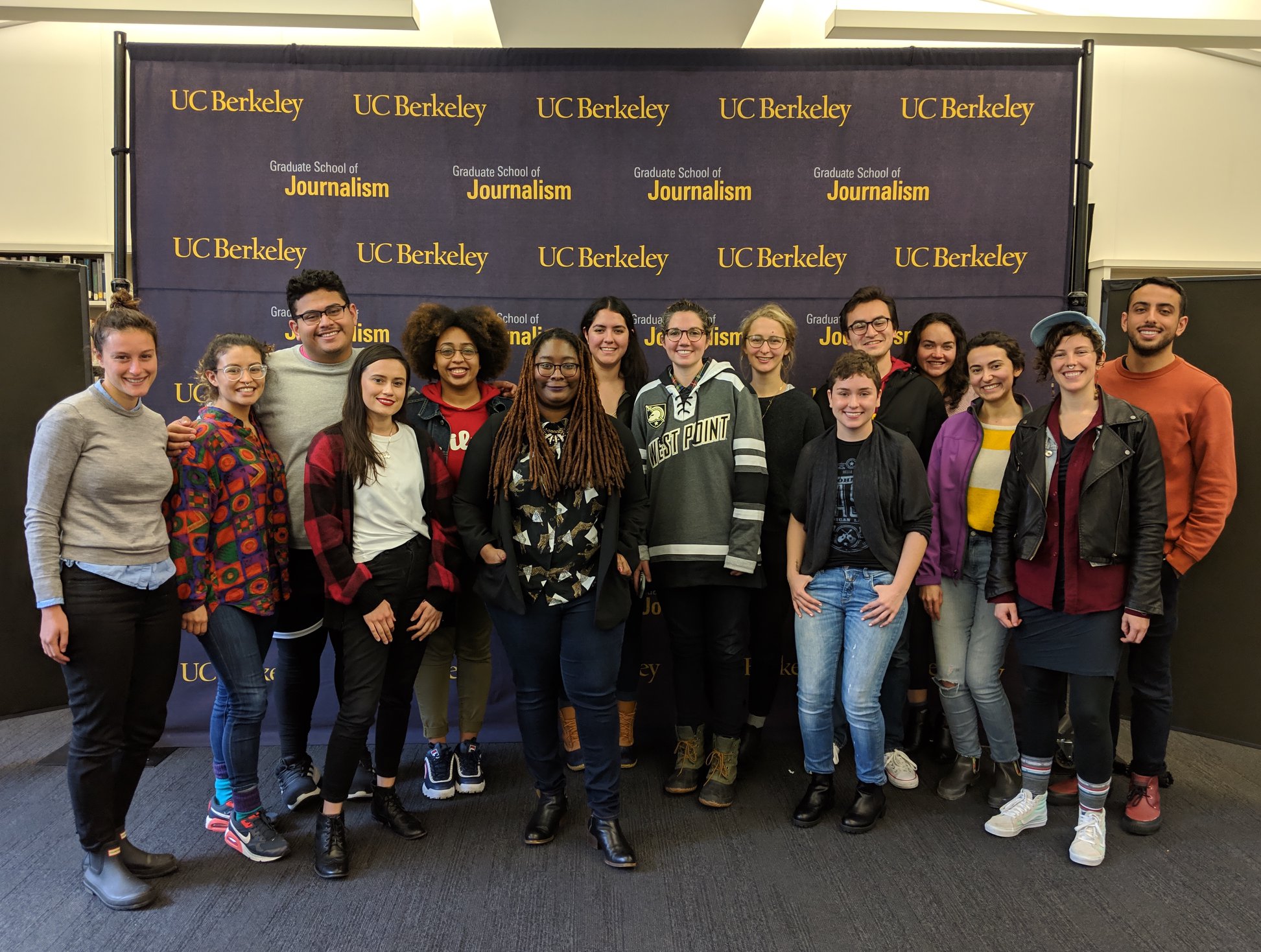
Left to right: Sara Harrison (’19), Jess Alvarenga (’20), Luis Hernandez (’19), Betty Marquez Rosales (’20), Lee Mengistu (’19), N’Jeri Eaton (’10), Nuria Marquez Martinez (’19), Meg Shutzer (’20), Nina Sparling (’20), Annie Berman (’20), Ricky Rodas (’20), Eleni Gill (’19), Sarah Cahlan (’19), Rachel Mueller (’20), Brandon Yadegari (’20). Photo: Julie Hirano
Alum N’jeri Eaton (’10), NPR’s deputy director of programming and podcast acquisition, gave tips to students on how to create and pitch a podcast to NPR.
It was old home week when KQED came to the J-School, with Ethan Lindsey, senior managing editor for news and a former audio journalism instructor at the School, alum Queena Kim (’00), senior editor of KQED’s Silicon Valley desk, and California Report host Sasha Khokha (’04). The KQED crew offered candid tales of how they found their paths in audio journalism, how the podcast boom has changed the audio landscape, and what students might want to keep in mind as they launch into their own futures in audio. KQED also hosted “Fridays in February,” when students interested in audio journalism could spend half a day at their studios, sitting in on production sessions and chatting with members of KQED’s radio news team.
IRP and Investigative Studios are founding members of the California Reporting Project, a coalition of more than 30 news organizations that was formed to report on previously secret records of police misconduct and use of deadly force. The IRP was an early partner with KQED and The San Jose Mercury News in filing hundreds of public record requests with the assistance of J-School students. Numerous students have also contributed research to the effort.
“Who Killed Lt. Van Dorn?” continues to play at film festivals across the country, including the GI Film Festival in San Diego, the Sedona International Film Festival, the San Luis Obispo International Film Festival, the Fargo Film Festival, and the Annapolis Film Festival. The documentary, produced by the IRP’s Zachary Stauffer (’08) and associate producer Jason Paladino (’15), is about the military’s deadliest aircraft.
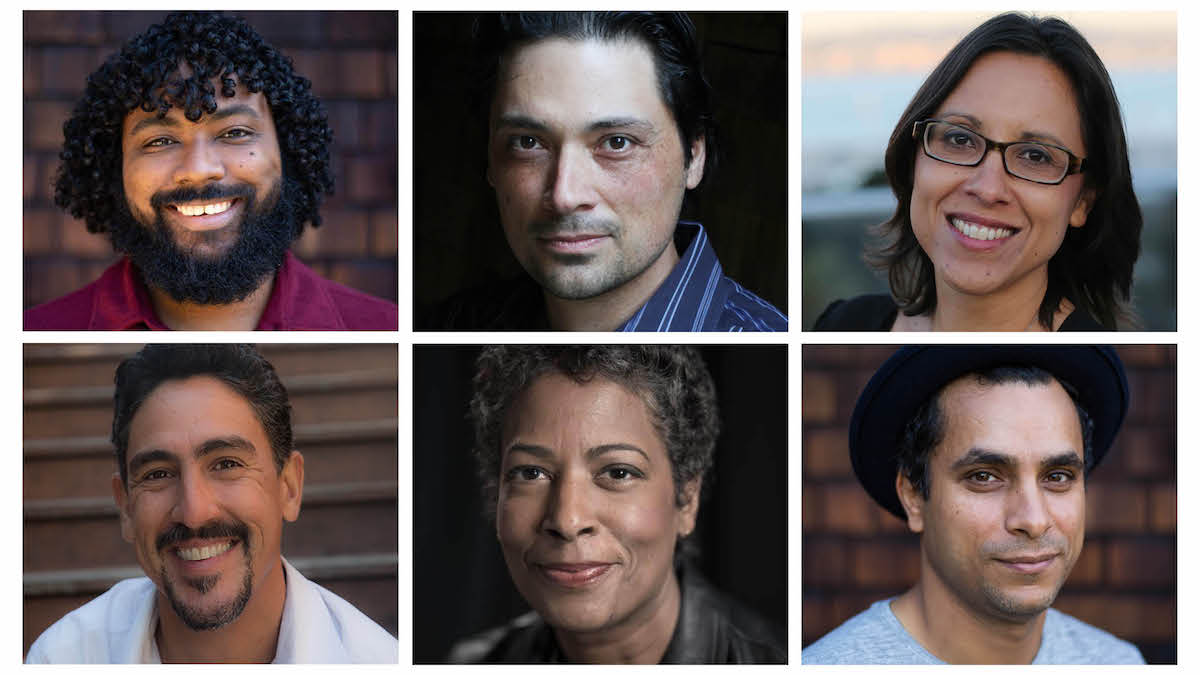
Clockwise from top left: Drew Costley, Richard Koci Hernandez, Carrie Lozano, Wesaam Al-Badry, Dawn Porter and Andrés Cediel.
On April 8, we hosted a showcase of distinguished student work at the UC Berkeley Art Museum and Pacific Film Archive (BAMPFA) as part of UC Berkeley’s Arts + Design initiative, the sequel to a very successful inaugural show in 2018.
Upcoming events and dates of interest: The annual Reva and David Logan Symposium on Investigative Reporting will be held April 26-28 … Don’t miss “Woodstock,” photographs by Baron Wolman in the Reva and David Logan Gallery for Documentary Photography in the halls of the School through May 3 … Alumni Reunion is set for Saturday, May 11 from 11:00AM to 2:00PM. The deadline for admissions to the Class of 2021 is Dec. 1 … Enrollment in our summer journalism minor is sharply ahead of last year…can’t wait to meet the new cohort in May! New Berkeley Advanced Media Institute (BAMI) workshop: Multimedia Storytelling Institute: July 15-23. Sign up here.
The Reva and David Logan Book Symposium, which brings together photographers, academics, students and collectors to celebrate the published photograph, will be held May 3-4 in Sibley Auditorium on campus. The biennial event, which launched in 2017, is provided under an endowment at the UC Berkeley Graduate School of Journalism that established a permanent professorship in photojournalism and funds exhibits in the School’s Gallery. The events complement the Logan Photo Book Collection at the Bancroft Library at UC Berkeley, which brought the late David Logan’s exceptional collection of photography books to the campus.
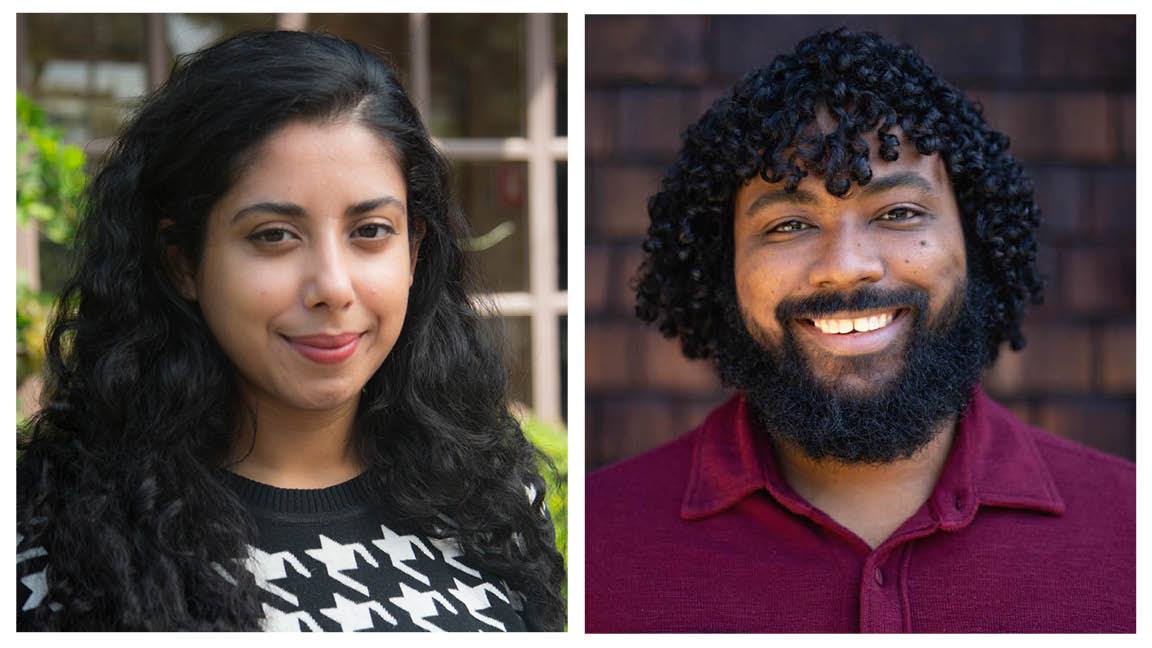
Padmini Parthasarathy and Drew Costley (’19).
We are looking forward to welcoming our Class of ’19 commencement speaker, New York Times reporter and host of the Times’s highly successful podcast “The Daily,” Michael Barbaro. Our student commencement speakers will be Padmini Parthasarathy and Drew Costley.
Our second annual Bloomberg summer journalism diversity program—an intensive, five-day collaboration with the University of North Carolina, Chapel Hill’s School of Media and Journalism—will start in the middle of May. Students will participate in instruction at the campus they choose, as well as visit a Bloomberg newsroom to see how reporters and editors put their journalism skills to work.
Finally, as the close of our fiscal year approaches, we hope you’ll consider giving. We’re looking for money to support training the next generation of journalists, and in the longview, the vital contribution they will make to this invaluable profession.
You don’t need me to tell you the need for probing, intelligent, well-grounded and ethical journalism has never been greater, and as we have done over the past 50 years, Berkeley is dedicated to preparing the future leaders of the journalism a functioning democracy demands.
Stand with Berkeley Journalism. Fund excellence.

Ed Wasserman
Dean
About this communique: News from the Desk of Edward Wasserman is a quarterly email newsletter sent to alumni, donors, students, faculty, media partners and others in Berkeley Journalism’s broad community. If you’d like to follow ongoing developments in real-time, find us on Facebook, Twitter and Instagram. Have alumni news or accomplishments to share? Please send it, along with a high-res headshot to journalism@berkeley.edu. Are you hiring? Please reach out to career.services@berkeley.edu.
